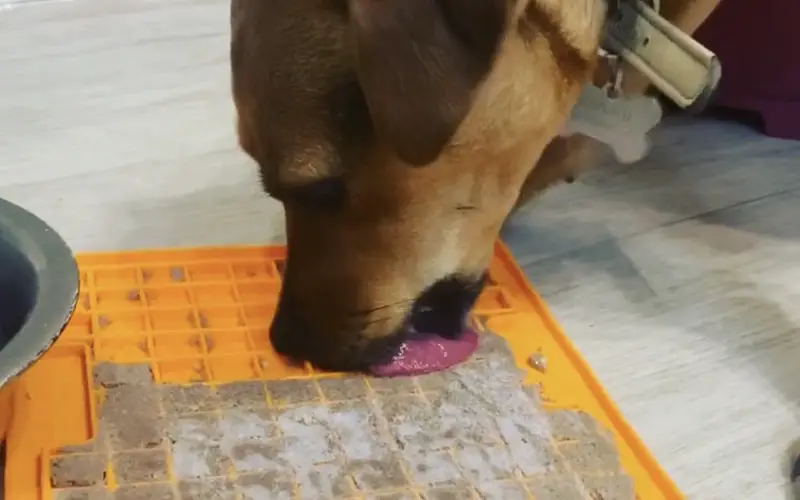patterdaleterriers.co.uk is a participant in the Amazon Services LLC Associates Program and other affiliate advertising programs designed to provide a means for us to earn fees by linking to Amazon.co.uk and affiliated sites. Affiliate links may be used on this page and in patterdaleterriers.co.uk articles, but they do not impact on the price that you pay and they do help me to get this information to you for free. Read my privacy policy for more information regarding affiliates.
Patterdale terriers are such a fun breed of dog to own. They are high energy, intelligent and loyal to their owners. However, due to their characteristics there are some common Patterdale terrier behaviour problems. What are they? And as a Patterdale owner, how can these be resolved?
Patterdale terrier Behaviour Problems
Prey Drive – Chasing and Killing small Creatures
As Patterdale terriers were originally bred for hunting, their prey drive that is difficult to get rid of. After all, the breed was bred in the Lake District for hunting foxes and badgers. Many farmers use them today for ratting or protecting game birds during a hunt.
This means that they will go for small creatures such as rats or squirrels quite often ignoring their owners call for them to come back. This can be extremely dangerous near main roads. Their prey-drive can also be an issue if a Patterdale terrier is brought into a household that has small pets such as guinea pigs or hamsters. It is not ideal for Patterdale and rodents to mix as pets. If your guinea pig escaped this could end in disaster.
The Solution? The best way to deal with this is to avoid mixing patterdales and pet rodents in the same household, or devise a way to keep them separate. Also keep them on leads around wild animals such as rabbits or squirrels.

Stubbornness in Training
Stubbornness is a common Patterdale terrier trait and this makes Patterdale terrier training quite a challenge! You may find that sometimes your dog just does not want to do what you want it to do. If your Patterdale’s focus is elsewhere it can sometimes be difficult to get back.
The Solution? Sometimes when your dog is stubborn, it just needs a break. Take a small break from training and return to the same training again later and you may see a difference. On the plus side Patterdale terriers are extremely food motivated which makes them a good grade for learning new tricks and enjoying agility. Using treats – particularly high level treats such as chicken or liver cake is a great way to refocus your patterdale.
Separation Anxiety
A big issue with Patterdale terriers is separation anxiety. They create a strong bond with their owners and feel extremely anxious when they are left alone. This common Patterdale terrier behaviour problem can manifest itself in howling and barking which can annoy the neighbours and also destructive behaviour.
The Solution? The way forward is to start leaving him for short amounts of time and then build it up. If he howls when locked in a room, open the whole house up to the dog as normal, just hiding away things he can chew and emptying bins. Then test him out with food dispensing toys such as a Kong or Licky Mat for dogs. When you know what he is ok to be left with you can then start him or her having these when left for short periods and then built it up. Hide treats and chews around the house for your patterdale to hunt and find – all these distractions will calm his or her anxiety and help to pass the time while you are out.

Aggression in Patterdale Terriers
If not socialised well with other dogs, children and adults, it is possible for a patterdale terrier to develop aggression. I once heard of a family who had a patterdale terrier chained up in the garden without playing with him or walking him regularly. He became what was perceived to be ‘aggressive’ towards the children jumping and barking ore snapping as they approached. He had not been adequately exercised or played with and intellectually stimulated which is why it developed, as this patterdale became an excellent family pet in the right home.
Our rescue Patterdale terrier Blake was aggressive towards men because we rescued him from the RSPCA and he came from a home where the male was aggressive towards the dog and his female partner. Therefore Blake had learnt to defend himself and his ‘dog mom’. It took a while, but he eventually built up trust between us and slowly he got used to meeting male strangers.
Patterdale terriers are loyal and loving to their owners and so if they are treated right, and well trained and socialised, it is very rare that they are aggressive to their dog mom or dad. You might be interested in reading my blog on Are Patterdales aggressive?
The Solution? If your patterdale terrier is aggressive it is a good idea to seek professional help through a one to one dog trainer and then to go into classes when the time is right. Aggression towards people in Patterdale terriers is often through fear and so patience and building up trust is important. If they are aggressive towards a particular family member try letting that person feed him/her and give the dog treats so that they develop a bond. If the dog is aggressive towards strangers, you can use people that you know as ‘stooges’ to treat him or ignore him when he approaches, getting the dog used to strangers slowly and in a controlled environment.
Chasing Bikes and Cars
The chasing instinct is a common patterdale terrier behaviour problem and often can involve chasing cars and bikes. This can be very dangerous especially if the dog is not on a lead and refuses to come back when called. It can cause accidents and injury to your dog if not controlled and so if your patterdale terrier does chase bikes and cars you will want to try to do something about it.
The Solution? Clicker training is a good approach to take. Start clicker training in the house when the dog gets a reward within 5 seconds of hearing the click. You can then progress this to outside when he starts to make the association. You may find that you need to use very tasty treats such as liver cake, chicken or small bits of sausage. You might also need to click and treat the dog several times when the bike or car is going past to keep him distracted. You should also demonstrate that you are in charge when leash walking your dog and so as soon as he starts chasing or barking at the car or bike instantly turn around and start going in the other direction. This is reinforcing the fact that the car or bike is not a threat. You could also try riding your own bike near your dog in an enclosed place and treating him when the bike comes near.
In addition, it’s always good to have distractions such as other tricks and activities for your dog to focus on for example Nina Ottosson dog puzzles and agility weave poles.
Patterdale Terrier Behaviour Problems – What works for you?
How have you dealt with your patterdale terrier behaviour problems? What has worked, or not worked? I’d love to hear your comments.
You might also like to read about


I got my patterdale terrier at 5 months old, from a rescue. She had been spayed and all shots. She was sweet and loving, but gradually got destructive and chewing everything. Now we have had her nearly a year and she is gettinf more and more aggresive towards our senior poodle, and has been growling at me when I try to pick her up or put her on my lap. She has also snapped at my 6 year old grandson that she has always been around. She is not food or toy aggresive. I take her for walks and let her run laps in our fenced yard. I am very worried she will bite someone and she runs and snaps at your legs. I love her to pieces but i am afraid she hasn’t been trained well. please help, I cannot afford to take her to a trainer. please help!
You can divert the chewing with interactive dog puzzles and chew bones/dentasticks. Make sure she always has something to do and something to chew on. As for the growling and snapping I would recommend that you consider positive reinforcement with clicker training when you are near the stimulus such as the poodle or children. There are a few articles on these techniques on the blog, I hope that they help and wish you all the best. Keep in touch.
My patterdale is a rescue he is 9 years old now we have had him for 7. One of the problems we have is inconsistency whilst on walks, when he is on the lead he is aggressive towards other fails and will bark at them across the street, but off the lead is friendly and playful with them, we get nervous letting him off the lead just in case, does anyone have any suggestions?
Barking? I dont mind but others do.
Can you tell me why my patterdale cross
Is naughty late in evening barking & nipping
Is this because she’s tired.
Sometimes ours has what we call a ‘happy hour’ around 9pm-10pm at night. It’s a sudden burst of energy just before they are ready to go to sleep. We find a good game of tug-o-war and a bit of rough housing sorts in out! Then he sleeps so well after that.
I’m a petsitter who has cared for 3 Patterdales at different times (same owner) – the first one was mostly interested in getting to my cats which were separated from her. She returned on a separate visit and managed to grab one of my cats – I couldn’t get her to let go and the cat died.
Several years later the client asked to return with a newer Patterdale and we did a meet and greet which was positive. During the visit, the newer Patterdale snapped at 2 of my labs and appeared to be stalking one of them from behind unless I stopped the interaction. Do they have a strong prey drive?
Needless to say, I will not have them in my home but want to know how to understand their behavior to guide the owners if I can.
So sorry to hear that this happened to your cat – how terrible. Yes, Patterdales have an extremely strong prey drive. They were originally bred for hunting in the Lake District and so the drive to chase and catch prey in inbuilt in their nature. Patterdale owners should be aware of this and do socialisation and training with other dogs and animals. If they know they have an aggressive dog they should be sending it places with a muzzle or letting petsitters know. Feel free to direct them to our blogs where we have a lot on Patterdale terrier training. I hope it helps.
I have a 1 1/2 yr old female patterdale, we got her spayed at a yr old. And ever since she’s been more growly at our cats,who she’s been raised with since she was 2months old. I don’t understand what caused the change and it worries me at times. She’s very affectionate with her humans and has plenty of stimulation. Any advice would be appreciated.
Hi Tricia, you might find this article helpful: https://patterdaleterriers.co.uk/can-patterdales-live-with-cats/
We have a 7 year old Patterdale and I’ll be honest, even though I read into the bread, I didn’t do enough research.
I didn’t know they needed so much exercise and stimulation.
Saying that, our patterdale can be very lazy. He’s in a good routine and likes to be in his bed by 9/ 9.30 and we couldn’t even if we wanted too, entice him on the sofa at this time. He knows it’s bed time.
Our issue is other animals. He doesn’t like other dogs, so barks at them when on walks and balks at the neighbors dog. To the point if we try to get him in, he growls.
He woke us all recently going nuts at the kitchen door, barking and growling. When we went and looked their was a hedgehog in the middle of the garden!
His pray instinct is unreal, hence why he’s never off the lead unless we have him enclosed, like a football pen.
Crazy little dogs lol.
I have a 2 year old patterdale male that I think was abused by the breeder before we got him. When we first got him he would shake really bad if my husband raised his voice. He snapped at my husband 4 times drawing blood. We had him neutered which seemed to help. Then last night he was sitting in the chair with my husband like normal and my husband was petting him. The dog snapped at him for no reason. The dog normally has a ball that he carries every where and even has it in his mouth when he is up in my husbands chair with him. He loss his ball and didn’t have it for 2 days. I am thinking that the ball is his security and if he doesn’t have it he gets nervous/anxiety. He has never snapped at me. He is actually very protective of me. It is just strange that he snapped at my husband because he has been doing very well with him to the point that he sleeps next to him and plays ball with him.
My 8 month patterdale is trying to gain the upper hand and will stare me out and bark at me how can I control his behaviour to make both of us relaxed .
Same here – often for ours it’s a way of him asking for something e.g. loo or food so once we let him out or feed him it stops! But for some it is persistent barking in which case ignoring and rewarding by fuss and treats when the barking is not happening. Hope that help! Let us know how you get on.
My Patterdale, Odin, is 3 years old in September this year. Recently he has started being disinterested in walks, he will be extremely excited to go out and then 10 mins into the walk it’s like he is over it and wants to go home. He was also out playing with other dogs yesterday and was fine and then all of a sudden, it was like he was tired and over it. In the evening I am told he was extremely restless and wouldn’t settle all night, in and out of the garden. We are wondering if he has something wrong with his heart/lungs and is getting over tired. He has a split home between myself, my ex partner and his grandparents (ex’s parents). He’s spends a huge chunk of time with his grandparents during the week and I have him as frequently and possible around work and weekend. I am also wondering if he has separation anxiety from me and that is why he isn’t settling, although I have experienced him being over a walk and wanting to go home. He spent all of his puppy life with me by his side so I wonder if this is the reason or if it is a medical reason.
Does anyone have any advise one this. Thank you.
I would definitely get your vets advice, it could be psychological or something medical. It’s not usual for Patterdales not to want to walk for more than 10 minutes.
My Pat is VERY stubborn!
She loves a walk, but she always dictates where we go. She will just sit, refusing to budge, if she does not go the way she wants to! Sometimes bribing with a treat works, but as she gets older (now 8) she would rather sit while I look like a dog-statcher.
It can be embarrasing at times, I have had to pick her up and walk a few paces to get her going again. There is no rhyme or reason to it. What was a great walk one day is no good the next.
Hubby gets annoyed when we have some lovely trails, but the little madam just wants to go down alleyways and through nettles.
My pat is just over 2 yrs old only got him 7month ago such a softie indoors but barks at other dogs passing us on walks tried a clicker not really working but also has very loud whine too almost like a scream at dogs too any advice please
Hi I have a 5 year old Patterdale and he grumbles!! Not all the time but if I move and he’s near me if o stroke him and he’s asleep? If I say bed he grumbles as he’s going to bed? Not aggressive but just grumbles at me.